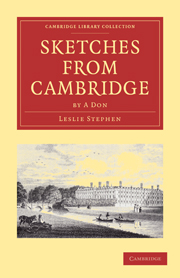CHAP. II - THE ROWING MAN
Published online by Cambridge University Press: 01 June 2011
Summary
Late writers upon University affairs have elaborately described one particular phase of University life. Whether it is really the most pieturesque phase, or only the most easy to describe, may be doubted. Perhaps the sect of muscular Christians—which derived its chief popularity from the genial eloquence of its reputed founder — has given a temporary prominence to the athletic undergraduate. When Alton Locke visited Cambridge, he regarded it with the stern eye of a chartist tailor. Bloated aristocrats, in the livery of their order, paraded the streets. Words of sacred import, but degraded by their common use as mere names of colleges, were bandied about with improper epithets prefixed to them. On the banks of the Cam one of these profane scions of nobility rode the unlucky “snob” into the river, and benevolently swore at him for getting in the way. But even Alton Locke, “tailor, chartist, and poet,” had a good word for the boat-races. The youths were rather ignorant, very brutal, and incredibly given to tuft-hunting. But, after all, there was good stuff in them. The clenched teeth, starting muscles, and heaving breasts of the racing crews showed something more than mere physical vigour. The blood of the Vikings, the pluck that won the battle of Waterloo—(would that the Vikings and the battle of Waterloo could be buried in one grave together!)—and the various idols by which the muscular Christian is accustomed to swear, all rushed into his mind together.
- Type
- Chapter
- Information
- Sketches from Cambridge by a Don , pp. 11 - 20Publisher: Cambridge University PressPrint publication year: 2009First published in: 1865

